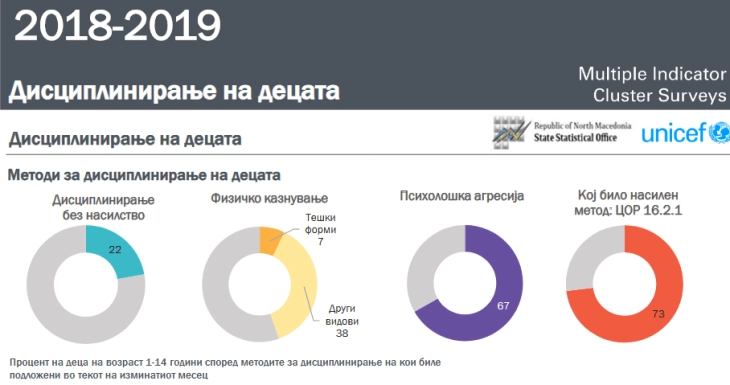Survey: 73 percent of children aged 1-14 experience violent method of discipline

Skopje, 3 December 2021 (MIA) – Seventy-three percent of children aged 1-14 have experienced some type of violent method of discipline, while only 22 percent experienced non-violent methods. About 67 percent of children were subjected to psychological aggression, shows a Multiple Indicator Cluster Survey (MICS) of the State Statistical Office carried out in 2018-2019 as part of the Global Programme on the state of children and women.
Forty-five percent of children aged 1-14 experienced some form of physical punishment, of whom seven suffered severe physical punishment.
According to survey data, boys experience violent discipline more compared to girls, while four percent of mothers/caretakers consider physical punishment to be necessary for proper upbringing and education of the child. This attitude is more prevalent among younger mothers and caretakers, as well as among those of the poorest quintile.
Considering the survey methodology, physical punishment is: shaking, hitting or slapping a child on the hand/arm/leg, hitting on the bottom or elsewhere on the body with a hard object, spanking or hitting on the bottom with a bare hand, hitting or slapping on the face, head or ears, and hitting or beating hard and repeatedly; Severe physical punishment is: hitting or slapping a child on the face, head or ears, and hitting or beating a child hard and repeatedly; Psychological aggression is: shouting, yelling or screaming at a child, as well as calling a child offensive names such as ‘dumb’ or ‘lazy’; Violent discipline is: any physical punishment and/or psychological aggression.
The North Macedonia Multiple Indicator Cluster Survey (MICS) was carried out in 2018-2019 by the State Statistical Office as part of the global MICS programme. Technical support was provided by the United Nations Children’s Fund (UNICEF). UNICEF, UNFPA and the British Embassy provided financial support.
Since its inception in the mid-1990s, the MICS programme has become the largest source of statistically sound and internationally comparable data on children and women worldwide. MICS is an integral part of plans and policies of many governments around the world, and a major data source for more than 30 Sustainable Development Goals (SDGs) indicators.
The State Statistical Office says the survey report was released in May 2020 but did not get the proper public attention due to the COVID-19 pandemic and activities related to the 2021 Census. In the coming period, the SSO will release info-graphics including data and key findings of the report.







